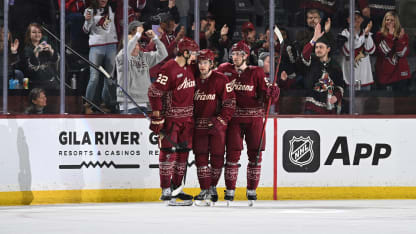"I think the biggest thing is back when I first took over, my thought process was if you're going to win a championship, you have to build a championship front office. That starts with your amateur scouting. Then it goes into your coaching staff. Then it goes into your pro staff and then it goes into your development staff, people that you really need to be difference-makers behind the scenes, along with a lot of technology and pushing the pace to become a new wave organization. We believe in the most amount of information, the best analytics, the best sports science, the best strength staff, everything that we can do to gain an edge. I think the biggest misconception about the Coyotes is we're floundering with an arena. Guys that we acquired through free agency, I said, 'Listen, I don't build rinks. I build organizations and I build teams and we're trying to build a championship team here in the desert and here's what we can do for you to bring you in and make you a Coyote. This is the opportunity that's in front of you.' Players bought in.

